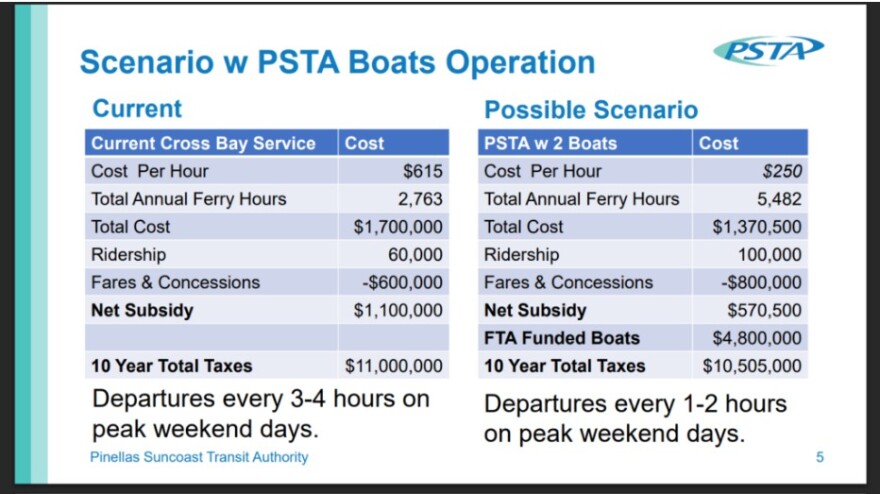A new and improved, locally operated and year-round ferry service between downtown St. Petersburg and Tampa is on the horizon.
The Pinellas Suncoast Transit Authority’s governing board unanimously approved accepting a $4.86 million federal grant to purchase two high-speed vessels Wednesday. CEO Brad Miller believes the enhanced service would cut the now-defunct Cross Bay Ferry’s costs in half.
PSTA now needs the Hillsborough Area Regional Transit Authority to do its part. HART received the unused funding, now nearing its sunset date, in 2021 and will vote on transferring the grant June 2.
“Even with one (ferry), just going to year-round service is going to be progress,” said St. Petersburg City Councilmember Gina Driscoll. “Getting two is like the next level. That’s the game-changer for us.”

How did we get here?
The Cross Bay Ferry has offered seasonal waterborne transportation across Tampa Bay since 2016. Boston-based HMS Ferries provided the service.
In March, the embattled company announced plans to replace its catamaran-style vessel with one that cruises at about half the speed. Hillsborough County then terminated its operating agreement with HMS Ferries in April.
The Cross Bay Ferry ended May 1 during its much-anticipated first year of continuous service. HART asked PSTA to vote on a grant transfer the same day.
ALSO READ: PSTA could purchase two ferries with $5 million grant
St. Pete Beach Mayor Adrian Petrila questioned the ferry’s success Wednesday. He said the vendor’s actions “speak louder” than PSTA’s metrics.
Local leaders began exploring operational changes in March 2024. Miller told Petrila that HMS Ferries likely read the room.
“I think they were told by Hillsborough County that they were probably not going to win the next contract, and they decided to take their boat back to Cape Cod,” Miller said.
PSTA will oversee the service and lease the vessels to an operator selected through a competitive process. Miller said the agency secured a state funding match that saves the region $1.2 million.
Tampa, St. Petersburg and Hillsborough County previously paid HMS Ferries $615 per hour for 2,763 annual service hours. Miller highlighted new estimates that show the two cities spending $250 hourly for 5,482 service hours.
Under the new plan, departures would occur every one to two hours, rather than every three to four hours, during peak weekend days. Driscoll noted St. Petersburg included over $300,000 in the proposed fiscal year 2026 budget for ferry service.
The city intended to use the money for a temporary dock along the Vinoy Yacht Basin. A draft site plan shows a permanent facility with two extensive docks near the St. Petersburg Museum of History.

Widespread support
Several public speakers advocated for accepting the grant. City officials, downtown partnerships and chambers of commerce from both sides of the bay support PSTA overseeing a more frequent, year-round service.
Driscoll said stakeholders could help mitigate potential funding gaps. St. Petersburg Councilmember Deborah Figgs-Sanders read a letter from Mayor Ken Welch.
“This grant represents a unique and time-sensitive opportunity to enhance regional transportation options, strengthen economic connectivity and improve mobility for residents and visitors throughout Tampa Bay, especially St. Petersburg,” Welch wrote. “We stand ready to assist in any way to help bring this transformative project to fruition.”
Clearwater Councilmember David Allbritton noted that local leaders have long discussed a regional ferry network. It would connect his city, the barrier islands, St. Petersburg and Tampa.
The proposal could find success in a congested area surrounded by water. While that “won’t happen overnight,” Allbritton called an improved Cross Bay Ferry – the name remains available – a “great start.”
Miller said PSTA secured a state funding match that saves the region $1.2 million. The agency will not subsidize vessel operations.
Tampa and St. Petersburg would split the estimated $570,000 net subsidy for two vessels and more frequent, year-round trips. The government partners previously paid $1.1 million annually.
Miller said leasing the ferries would generate $1 million annually that PSTA could use to benefit its bus system. Darden Rice, chief planning and community affairs officer, explained that increased transit use fosters additional federal funding for all capital needs.
Proponents push back on assertions that an entertainment-focused service is not a valuable piece of the region’s transportation puzzle. They say it still alleviates congestion and supports tourism, and a Forward Pinellas Study found that just 16% of all Tampa Bay traffic is for work.
“Our buses can’t travel over water, but ferries can, and we don’t have to build additional roads, widen roads or widen bridges,” Rice said. “The ferry offers a compelling transit choice.”
County Commission Chair Brian Scott said, “There’s a lot that I like about the ferry service.” However, he and Commissioners Chris Latvala and Chris Scherer expressed future funding concerns.
Scott suggested increasing a one-year interlocal funding agreement between Tampa and St. Petersburg to five years as a condition for approval to ensure PSTA is not stuck paying for vessel maintenance. His colleagues on the board agreed and voted 13-0 to accept the grant.

This content provided in partnership with StPeteCatalyst.com



